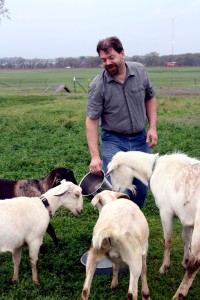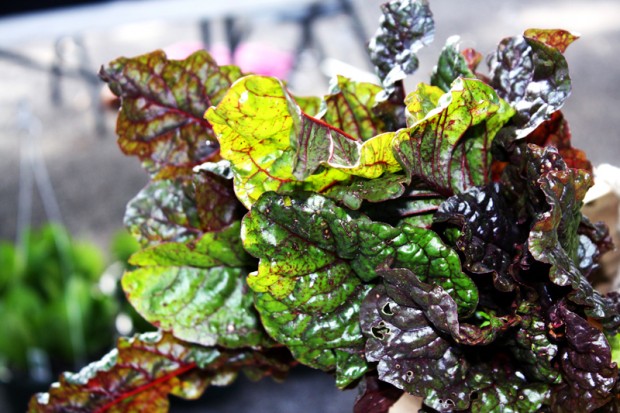Story by Caitlin Giddens
Photos by Alison Higgins
Less than three miles from Interstate 35, local farmer Carl Spain feels connected to the land. He finds company not in the hustle and bustle of city life, but with the free-range goats and chickens he’s grown to love. Spain’s farm mirrors the garden he studied in seminary, a union of man and animal. The goats and chickens do not solely exist to produce milk and eggs. They live in peace and freedom, harmonizing with nature by roaming Spain’s fields and relishing God’s creation.
Spain lives in West, a small community near Waco, working as what he calls a hybrid between a hobby farmer and a “grown up” farmer. He contributes crops to the weekly Waco Downtown Farmers Market, a new initiative in town. But more than his tangible contribution each Saturday, Spain plays a role in the return of trusting the local farmer, and in honoring animals.
“I don’t want to live on the land like a blight, squeezing money out of it just to make a living,” Spain said. “It’s a pleasure doing what I know I am called to do, and knowing what I do matters, at least with these 17 acres.”
More than 30 vendors meet each Saturday morning at the Waco Downtown Farmers Market (WDFM) to offer visitors the best organic produce, meat and cheese. The market was in the budding stages for years, until WDFM became a reality in November of 2011. This realization resulted from the efforts of local farmer Terry Vanderpool, Bethel Erickson-Bruce, the Heart of Texas Urban Gardening Coalition and the Waco Downtown Farmers Market Board.
Farming is not an easy life, Vanderpool insists. But Waco sees the fruits of farmers’ labor each Saturday at the market. And they want more.
“Being a local, small scale farmer is a lot different than any other thing today,” Vanderpool said. “It’s taking us back to our roots and taking us to a small-scale society, when people knew their farmer and the land they grow on. We’re providing vegetables that are improving people’s lives with more nutrients.”
With WDFM taking root in Waco, the community can find organic foods without a pilgrimage to Austin or Dallas. This marks the beginning of a greener Waco.
“This is one of the first pushes, so it’s a start,” Vanderpool said. “The parking lot at the market is not as full as those at the grocery store. There’s only a small percent of people who are interested in this now, but we’re doing our part. The Chamber is working, but there needs to be more done to promote local farmers.”
WDFM filled a need that Wacoans did not realize they had. Vanderpool explained that once people see the difference in fresh fruits and vegetables, they understand the organic movement.
“These vegetables are more attractive, which makes people excited about eating fresh vegetables from a local garden,” Vanderpool said. “There are more varieties and color varieties than what you can find in a grocery store.”

Variety is just one difference between industrial and local farming. Take one walk around Carl Spain’s ranch, and you’ll find chickens and goats living together. He describes his farming process as natural, and the way God intended.
“You can’t go to a confined animal feeding operation and see the livestock,” Spain said. “You can’t go look at the chickens in cages. But I welcome anyone to come and see the farm. I know my animals are happy because I interact with them on a daily basis.”
Spain’s roots in organic farming began when he saw the reality of large-scale agriculture.
“All you have to do is raise the issues, and people know it is wrong,” he said. “There is a considerable theological element to this. The theology of creation sees humans as responsible for taking care of the land God gave us.”
Brandon Tull, another regular farmer at WDFM, points to Christian faith as a reason for changing his lifestyle. A 2001 Baylor graduate, Tull worked with software programs in Dallas before returning to Waco.
“I get more satisfaction providing healthier food to CSA [Community Supported Agriculture] than providing software systems to a company,” Tull said. “There’s something inherently wrong with treating your animals as units of production, pumping them full of chemicals and steroids and antibiotics, then keep them moving as little as possible to get top dollar out of them. That lines up with my faith, and our calling to be good stewards.”
Tull spent a few years on a feed yard, witnessing the hushed secrets of industrial agriculture. This fostered a passion for respecting God’s creation through his career.
“When dollar rules, the quality of livestock goes down,” Tull said. “When you’re looking at meat in dollar signs, that’s a problem. A cow is meant to walk and graze. We’re not supposed to poison the animals.”
Tull sees himself as part of the young movement to a simpler, sustainable lifestyle. He finds inspiration in campaigns against mass industrialization, such as “The Greenhorns,” a film and blog focused on farmers.
“Their podcasts are pretty entertaining,” Tull said. “But they show that this life is a commitment.”
Although Tull does the majority of the labor work for his business, The Home Grown Farm, his family works together to provide all natural food at an affordable price. Tull’s brother helped with the branding and logo design, and his sister and grandparents lend their hands to the farm.
“We are a family operation, so if you look at what we’ve done for the spring, three generations have touched our work,” Tull said. “Everybody has a hand in it.”
Spain explained that farming began as a community project, each person playing a small role in a self-sufficient lifestyle.
“It makes for a long day when you do all the work yourself,” Spain said. “My wife does her part because her being a doctor supports this type of life. What I sell at the Waco Downtown Farmers Market covers my cost to go there. It’s more about meeting with other vendors and making relationships.”
Before moving to West nearly three years ago, Spain admits he lived the sedentary lifestyle of most Americans. He didn’t transform into a healthier farmer overnight.
Similar to the crops he plants, Spain’s new lifestyle required time to grow. He began by cutting soda from his diet.
“Now I hate the taste of it because it’s so overly sweet,” Spain said. “My wife and I eat less meat now, and most of the meat we eat is from the farm. You just have to change the way you think about things, like we have with seasonal eating. It just seems right to eat asparagus when it is in season now.”
Spain said becoming a full time farmer was a breakthrough in the way he thought about life, and in his overall health. He has lost weight and gained more energy as a farmer. But he admits to occasional indulgences in American habits.
“We still go to the grocery store now and then and eat frozen pizza about once a week,” Spain said. “But since making the change, I feel more active. I feel more alive.”
Find more info at: http://www.wacodowntownfarmersmarket.com

